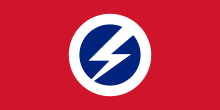
Back اتحاد الفاشيين البريطاني Arabic Брытанскі саюз фашыстаў Byelorussian Съюз на британските фашисти Bulgarian Unió Britànica de Feixistes Catalan Britská unie fašistů Czech British Union of Fascists German Βρετανική Ένωση Φασιστών Greek British Union of Fascists English Unión Británica de Fascistas Spanish اتحادیه فاشیستهای بریتانیا Persian
| British Union of Fascists | ||||||||
 Logotype officiel. | ||||||||
| Présentation | ||||||||
|---|---|---|---|---|---|---|---|---|
| Chef | Oswald Mosley | |||||||
| Fondation | ||||||||
| Fusion de | Nouveau parti (en) Majorité des Fascistes britanniques |
|||||||
| Disparition | (interdit) | |||||||
| Siège | Londres, Angleterre[1] | |||||||
| Journal | Action (en) The Blackshirt (en) |
|||||||
| Organisation paramilitaire | Force de défense fasciste, Stewards[2] | |||||||
| Think tank | January Club (en)[3] | |||||||
| Hymne | Comrades the voices[4],[5] | |||||||
| Religion | Protestantisme[6] | |||||||
| Positionnement | Extrême droite | |||||||
| Idéologie | Fascisme britannique | |||||||
| Adhérents | 40 000 (estimation, 1934)[15],[16] | |||||||
| Couleurs | Rouge, blanc, bleu Noir (usuellement) |
|||||||
| ||||||||

La British Union of Fascists (BUF, en français Union britannique des fascistes) était un parti politique britannique d'inspiration fasciste fondé en 1932 par Sir Oswald Mosley.
Fondé le à la suite d'une entrevue entre Oswald Mosley et Benito Mussolini, le parti se développe rapidement en se structurant autour d'un siège, d'un organe de presse et d'un service d'ordre militarisé (les Black Shirts, ou « Chemises noires »). En 1934, le mouvement compte 50 000 adhérents[17] et une centaine de milliers de sympathisants, et atteint son apogée en 1939, lors du meeting d'Earl Court. Malgré des résultats non négligeables aux élections municipales de Londres de 1937, le parti devient impopulaire à la fin des années 1930, avant d'être définitivement interdit en 1940.
- David Stephen Lewis, Illusions of Grandeur: Mosley, Fascism, and British Society, 1931-81, Manchester / Wolfeboro, NH, Manchester University Press, , p. 68
- Martin Pugh, Hurrah For The Blackshirts!: Fascists and Fascism in Britain Between the Wars, pp. 133-135, Random House
- Stephen Dorril, Blackshirt (2006), p.258.
- Trevor Grundy, Memoir of a Fascist Childhood: A Boy in Mosley's Britain, William Heinemann Ltd, , 31–33 p. (ISBN 0434004677)
- Alessandro Salvador et Anders G. Kjøstvedt, New Political Ideas in the Aftermath of the Great War, London, Palgrave Macmillan, , 165–166 p. (ISBN 978-3-319-38914-1)
- David Stephen Lewis. Illusions of Grandeur: Mosley, Fascism, and British Society, 1931-81. P. 51.
- David Stephen Lewis. Illusions of Grandeur: Mosley, Fascism, and British Society, 1931-81. P. 51.
- Oswald Mosley, Fascism: 100 Questions Asked and Answered, Question 1.
- A Workers' Policy Through Syndicalism, Union Movement, (ISBN 9781899435265)
- Oswald Mosley. Fascism: 100 Questions Asked and Answered. 10 points of Fascism: V. The Corporate State
- Roger Griffin. Fascism, Totalitarianism And Political Religion. Oxon, England, UK; New York, New York, USA: Routledge, 2005. P. 110.
- (en) W.F. Mandle, Anti-Semitism and the British Union of Fascists
(en) Robert Benewick The Fascist Movement in Britain, pp. 132-134
(en) Alan S. Millward, « Fascism and the Economy », in Walter Laquer (ed) Fascism: A reader's Guide, p. 450
(en) Nigel Copsey, Anti-Fascism in Britain, pp. 38 et 40-41. - Richard Thurlow. Fascism in Britain: A History, 1918-1945. Revised paperback edition. I. B. Taurus & Co. Ltd., 2006. Pp. 28.
- Oswald Mosley. Fascism: 100 Questions Asked and Answered. Question 88
- David Powell, British Politics, 1910-35 - The Crisis of the Party System, Routledge, (ISBN 9780415351065, lire en ligne), p. 181
- G.C. Webber, « Patterns of Membership and Support for the British Union of Fascists », Journal of Contemporary History, vol. 19, no 4, , p. 575–606 (DOI 10.1177/002200948401900401, JSTOR 260327, S2CID 159618633)
- Sykes 2005, p. 65.